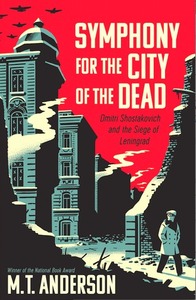Take a photo of a barcode or cover
370 reviews for:
Symphony for the City of the Dead: Dmitri Shostakovich and the Siege of Leningrad
M.T. Anderson
370 reviews for:
Symphony for the City of the Dead: Dmitri Shostakovich and the Siege of Leningrad
M.T. Anderson
I've always been a Shostakovich fan, but this brought everything to another level. The story weaves seamlessly between a Soviet history refresher and a biography about the internal struggle of artists under the Communist regimes. Probably not the best timing to read about loss of power & starvation in WWII Leningrad while living through a once in a lifetime power grid failure in the midst of a winter storm, but I was moved to understand at least a small fraction of their fear. Highly recommend if you are a fan of historical non-fiction and/or the truth of music affecting the world around us.
dark
emotional
hopeful
reflective
medium-paced
I had a hard time rating this. While I really love non-fiction books about historical events like the Russian revolution, this book just didn't draw me in the way that Candace Fleming and Steve Sheinkin's historical non-fiction books do. I really enjoyed the audio of this because the producers worked in parts of Shostakovich's symphonies, so you could actually hear the music that was being described in the book. The hard copy was full of photos that transport you to the era let you see and feel the devastation that occurred in Leningrad, but I still did not really connect with Shostakovich. Something about the writing left me unable to feel what I think Anderson wanted readers to feel. The things that happened in Russian were atrocious, but the story-telling here leaves something to be desired. I just think I the story could have been told in a way that made me feel more emotion about this awful time in history.
A masterful blend of history, biography, and music all pointing to the power of humanity through the arts. I listened to an audio, which was wonderful because it had bits of the music he was taking about unobtrusively in the background.
I am going to rate it 5 stars. My only gripe it is specifically geared for young people or it was marketed that way. There is no way a teenager is going to read this unless they are already fascinated with the subject. I thought it was a well-researched book, and I really like the premise. It is a dense book with 100 pages of footnotes at the end. I would recommend it, for adults or excerpts for High School students. Also has a lot of photos and maps. This book is one of the best about the time period and using Shostakovitch as a point of view was a genius decision.
I loved this so much I'm going to be teaching it next year. Not only is the language clear and the story compelling, but it goes out of its way to explicitly discuss authorship and point of view as they affect the credibility of historical sources. It's a history teacher's dream.
Review copy: final copy from publisher
This is a unique look at the Siege of Leningrad. It follows Dmitri Shostokovich and his life up to and beyond WWII and how his music played a role in the siege. I was fascinated by the story. The story was told powerfully. It was very hard to look at the death though. The numbers are mind-numbing. There was a point where I was overwhelmed by the horror, but Anderson must have known that it would be difficult for readers to continue because right after that, he turned he focus to people who did amazing kind and loving things. He started to share stories of people who were brought together during the siege rather than torn apart.
This will be a story that stays with me.
This is a unique look at the Siege of Leningrad. It follows Dmitri Shostokovich and his life up to and beyond WWII and how his music played a role in the siege. I was fascinated by the story. The story was told powerfully. It was very hard to look at the death though. The numbers are mind-numbing. There was a point where I was overwhelmed by the horror, but Anderson must have known that it would be difficult for readers to continue because right after that, he turned he focus to people who did amazing kind and loving things. He started to share stories of people who were brought together during the siege rather than torn apart.
This will be a story that stays with me.
Super interesting look at a very dark time in Russia's history! Despite some dark and gruesome happenings, the book is full of hope, and I love the message of the power of music. I'm going to try and find some Shostakovich symphonies to listen to.
The audiobook kept me hooked. (Though I did have to listen to things at 1.5x to tolerate the slow reading pace of the author)
Summary: An account of the Siege of Leningrad reveals the role played by Russian composer Dmitri Shostakovich and his Leningrad Symphony in rallying and commemorating their fellow citizens.
The audiobook kept me hooked. (Though I did have to listen to things at 1.5x to tolerate the slow reading pace of the author)
Summary: An account of the Siege of Leningrad reveals the role played by Russian composer Dmitri Shostakovich and his Leningrad Symphony in rallying and commemorating their fellow citizens.





